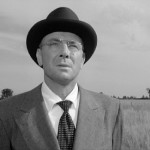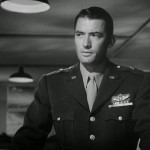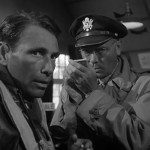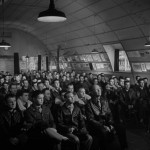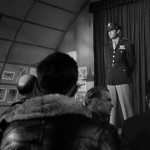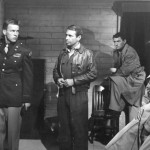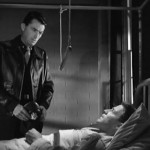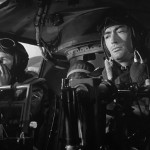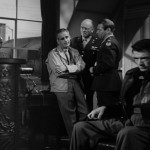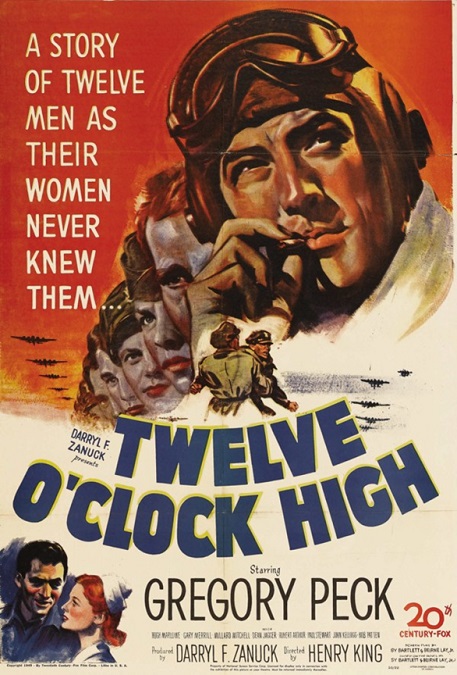
Twelve O’clock High – 1949
Here we have another war movie, this one starring Gregory Peck as a WWII bomber pilot. The film was good, but it had the potential to be great. Sadly, it fell a bit short of the mark. Don’t get me wrong – I enjoyed it, but I could have enjoyed it more.
The film was focused around a central issue. It was a real issue that existed in the war and the film really went out of its way to explore it from a number of different perspectives. It was battle fatigue, both psychological and physical. How far could men be pushed to continue putting their lives on the line, day after day? How long could they endure the constant mental anguish of seeing their friends being killed? How much death could they take and give before their minds began to shut down? How much could a man endure?
In the film, they called it “maximum effort,” and they spent a good amount of time trying to define it. The men of the 918th Air Division is known as a “Hard-luck” group. They have low morale because of their frequent losses. Their commander, Colonel Keith Davenport, played by Gary Merrill, is like a father to his men. He knows them all personally, grieves when any one of them is killed, and goes to bat for them when they are ordered into dangerous missions, saying that they need a rest from the constant flying.
But the Air Force is trying to perfect precision daytime bombing. Unfortunately, Colonel Davenport is the wrong man for the job of leadership because of his over-familiarity with the men serving under him. In comes Brigadier General Frank Savage, played by Peck. He is as tough as nails, and through strict and rigorous discipline and training, he molds them into the best bomber squadron in the Air Force.
The drama of the film comes in when his hard and emotionless style of command meets resistance at every turn. Nearly every pilot asks to be transferred out from under his command. They resent him, but eventually come to respect him because their mission success rate increases dramatically, just as their mortality rate decreases. Like him or not, he was just what their low morale needed.
But it was the end of the film that surprised me. Here they have Hollywood superstar, Gregory Peck, playing the hero, the man who has all the answers, the man who always gets the job done. And then, from out of nowhere, he learns, first-hand, exactly what “maximum effort” really means. He is getting ready to go on the most important bombing run, and his psyche finally cracks. His limbs stop responding and his conscious mind shuts down. He becomes catatonic, unable to move.
Apparently, extreme stress can actually do that to a man, if he is pushed (or pushes himself) far enough. I was surprised that his character showed human frailty. In Hollywood films, the lead actor is usually portrayed as a perfect male specimen. He is brave, honest, and true. He is fearless and tough. He always knows the right thing to say, and never fails in his mission. But here, Peck broke. He shows weakness in an almost sad way. I both respected and admired him for taking the role.
Another actor who I thought did a good job was Dean Jagger, playing the part of Lieutenant Colonel Harvey Stovall. The film actually starts out with Stovall returning to the abandoned air field after the war’s end, and so the main body of the movie is really his flashback. Then the end of the movie returns to Stovall as he finishes his recollections and leaves the empty field. Stovall was General Savage’s right hand man, too old to fly any bombing missions, but willing to do whatever he could out of his belief in the rightness of opposing the Germans. Jagger won the award for Best Supporting Actor for the role.
He also had one of the best lines in the film, which seemed to sum-up one of the horrors of the war, saying, “That is not why I am drunk tonight. I got drunk because I am confused. I was thinking, which is a thing a man should not do, and all at once I couldn’t remember what any of them looked like. I, I couldn’t see their faces, Bishop, Cobb, Wilson, Zimmy, all of them. All of you. They all looked alike, just one face. And it was very young. It confused me. I think I shall stay drunk until I’m not confused anymore.”
But overall, I would have like to see a little more aerial combat, showing the horrors that the men faced every day. And the scenes that did, needed to who more than just Peck in his pilot’s seat. They needed to show the harsh, bloody dangers that the crew faced to get me to more fully understand “maximum effort.” I think things like that may have pushed the film from good to great.
